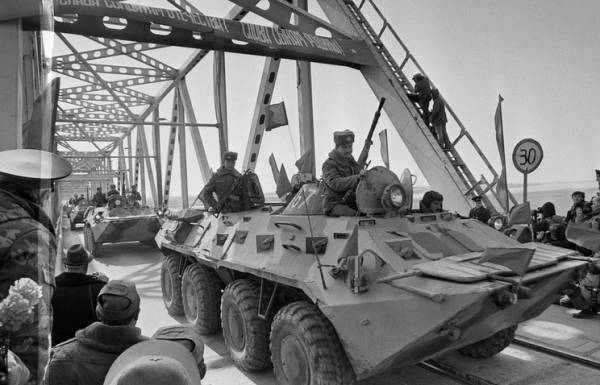“We go East”: what has led to the withdrawal of Soviet troops from Afghanistan
According to who led the withdrawal of Soviet troops, Boris Gromov, in Afghanistan was not victory, nor defeat.

Exactly 30 years ago, may 15, 1988, the Soviet Union started withdrawal of troops from Afghanistan. For the nine months has left the country more than 100 thousand Soviet soldiers. How the decision was made to leave Afghanistan and what it brought out at TASS.
“It’s just a Fig leaf”
The timetable for the withdrawal of Soviet forces was approved in the framework of the so-called Geneva agreement, or the Agreement on settlement of the situation in the Republic of Afghanistan. Formally it was a negotiation between the Pro-Soviet government of Afghanistan headed by Mohammad Najibullah, and Pakistan, behind which stood Washington. The USSR and the USA participated in the negotiations only as “guarantors”. The Afghan armed opposition did not participate in the negotiations, having rejected the opportunity in the beginning.
So the fate of the Soviet troops as if was decided without the participation of the Kremlin, and even without its opponents — the White house and the Mujahideen.
Again, formally, the talks focused mainly on refugees. Afghanistan and Pakistan also promised not to interfere in the Affairs of each other. But everyone understands that the main thing — the Soviet troops.
As recalled, the commander of 40th army, Boris Gromov, directly supervised withdrawal, Najibullah though, and agreed to the terms of Geneva, but urged Moscow to fully withdraw the contingent is not. Paradoxically, then, it was supported by the Minister of foreign Affairs of the USSR Eduard Shevardnadze, who at the time was the “hawk” of the Moscow diplomacy, and only later began to agree in everything with those of Washington.
“President Najibullah begged, tried to persuade us to stay, that would be a violation of the Geneva accords, and leave at least 30 thousand soldiers. The Minister of foreign Affairs of the USSR Eduard Shevardnadze him in this very supportive, just pushed, punched, so we’d leave some troops to guard the airport, Kabul, and the road from Kabul to the Soviet Union, and along the way also and Bagram air base”, — told TASS Boris Gromov.
Fears of Najibullah and Shevardnadze was clear: the Mujahideen are still attacked Soviet and government installations, and the Americans continued to supply them with weapons. The unilateral withdrawal of troops in this situation from the side looked like a capitulation. Even his formal task in Geneva is not solved — the return of the refugees, Afghanistan and Pakistan, as before, interfered in the Affairs of each other.
Just a month since the beginning of the troop withdrawal the President of Pakistan Zia-ul-Haq explicitly stated that the agreement “is just a Fig leaf”.
“A trap for the Russian”
As follows from the declassified CIA documents, us intelligence operation in Afghanistan, codenamed “Cyclone” began before the arrival of the Soviet soldiers and continued after the decision on their output before 1990. The US was supplying the Mujahideen of the latest weapons, including portable anti-aircraft missiles “stinger” ammunition, uniforms. In addition, with the Afghan opposition were American instructors. At the same time publicly and officially, Washington has categorically denied involvement in the conflict. In fact Moscow then provoked.
In an interview with French magazine Le Nouvel Observateur, former US presidential Advisor on national security Zbigniew Brzezinski says: “This secret operation was a brilliant idea! We lured the Russians into the Afghan trap”. The same is confirmed in his memoirs “From the shadows” former CIA Director Robert gates.
Moreover, Brzezinski notes that they had stepped up the supply exactly at the time of the campaign for the withdrawal of Soviet troops. “First, it was a humiliation for the Russian. Second, we expected that they will stop the withdrawal. And the second time walking into a trap,” he says.